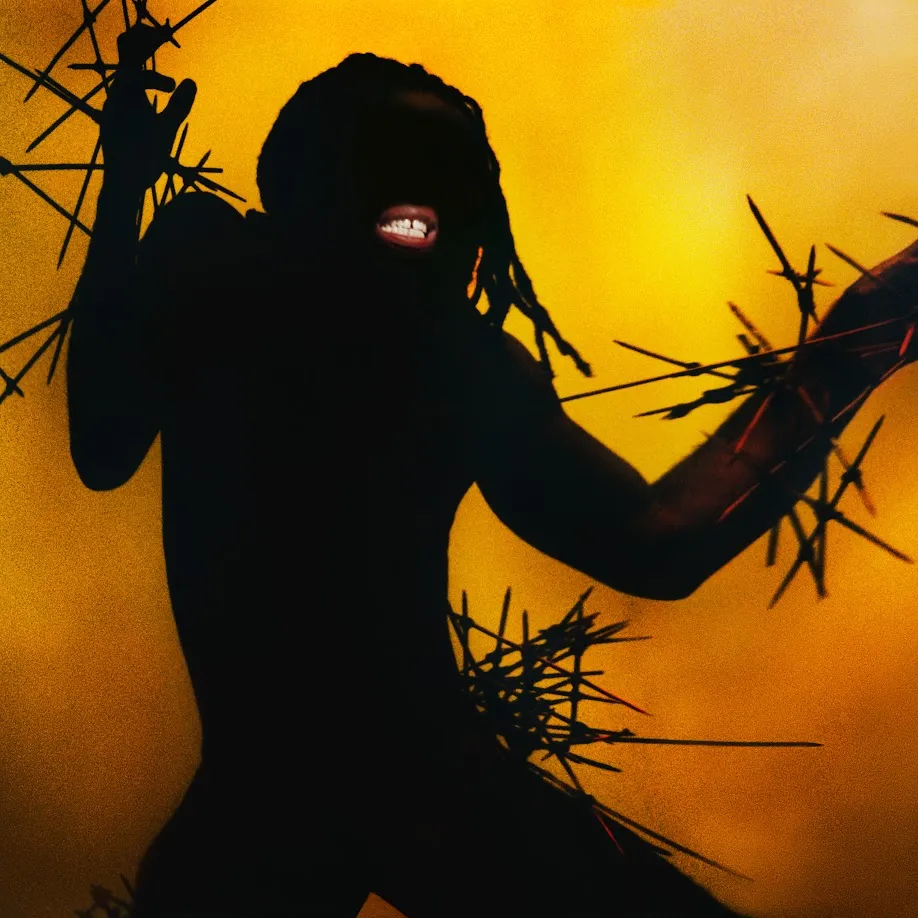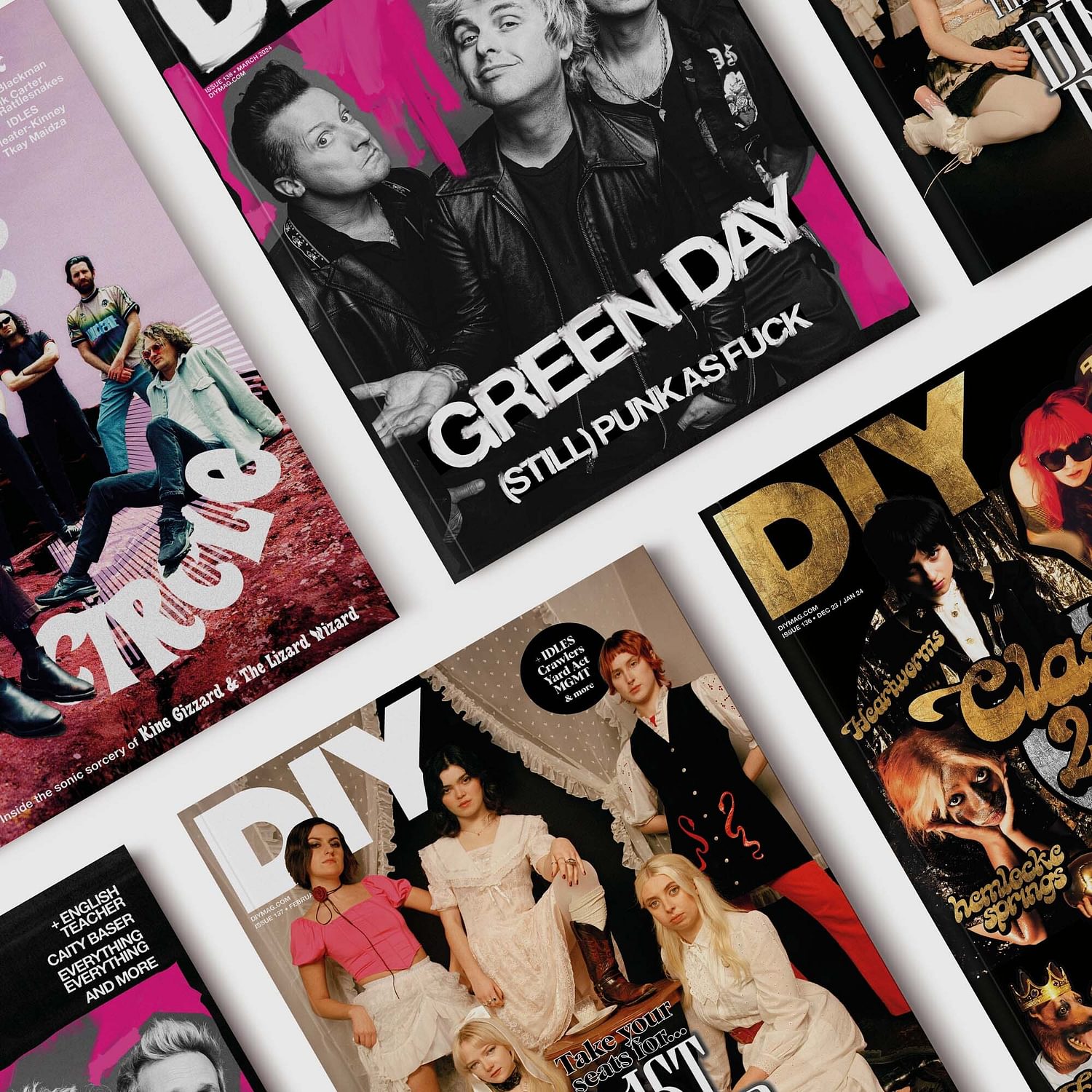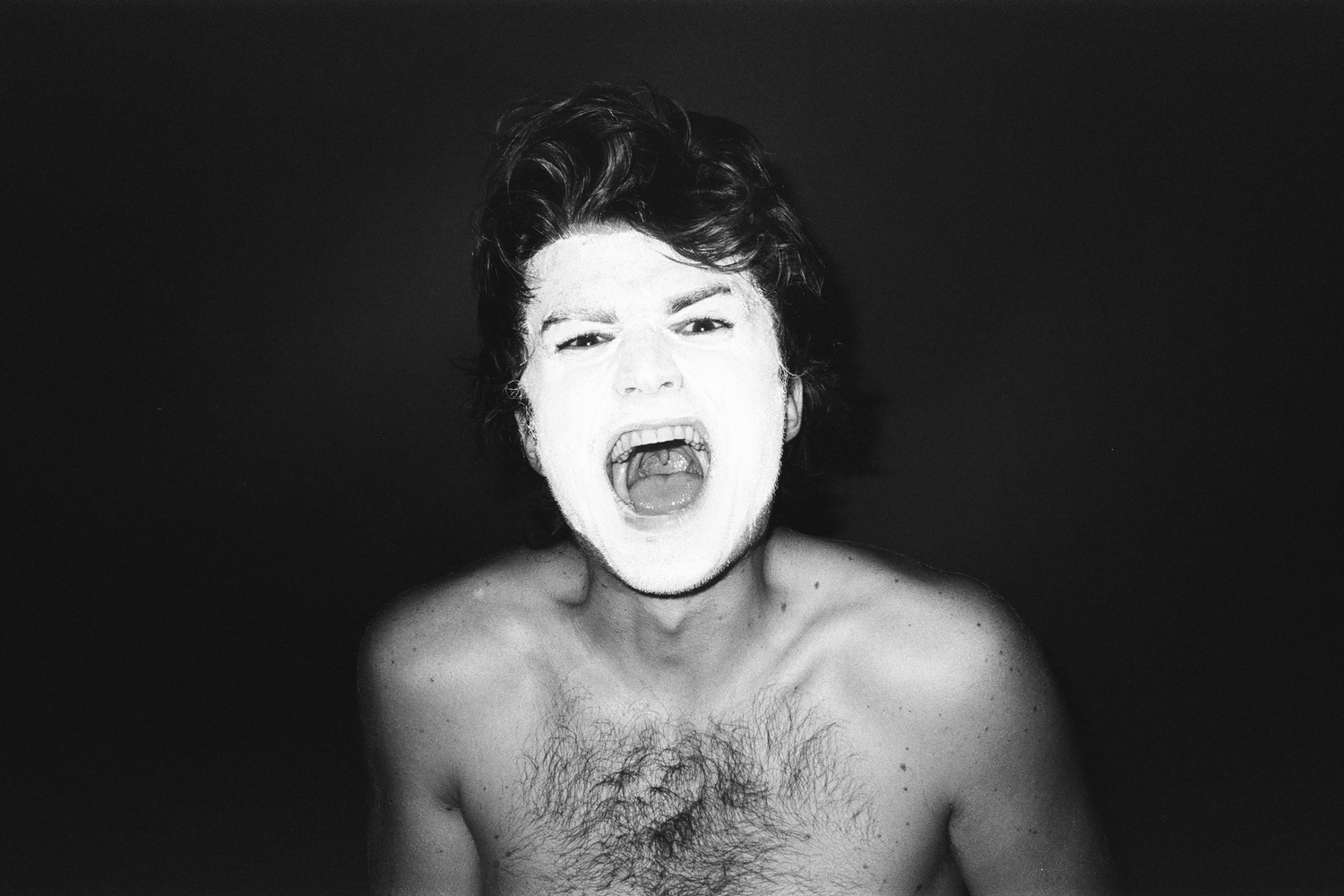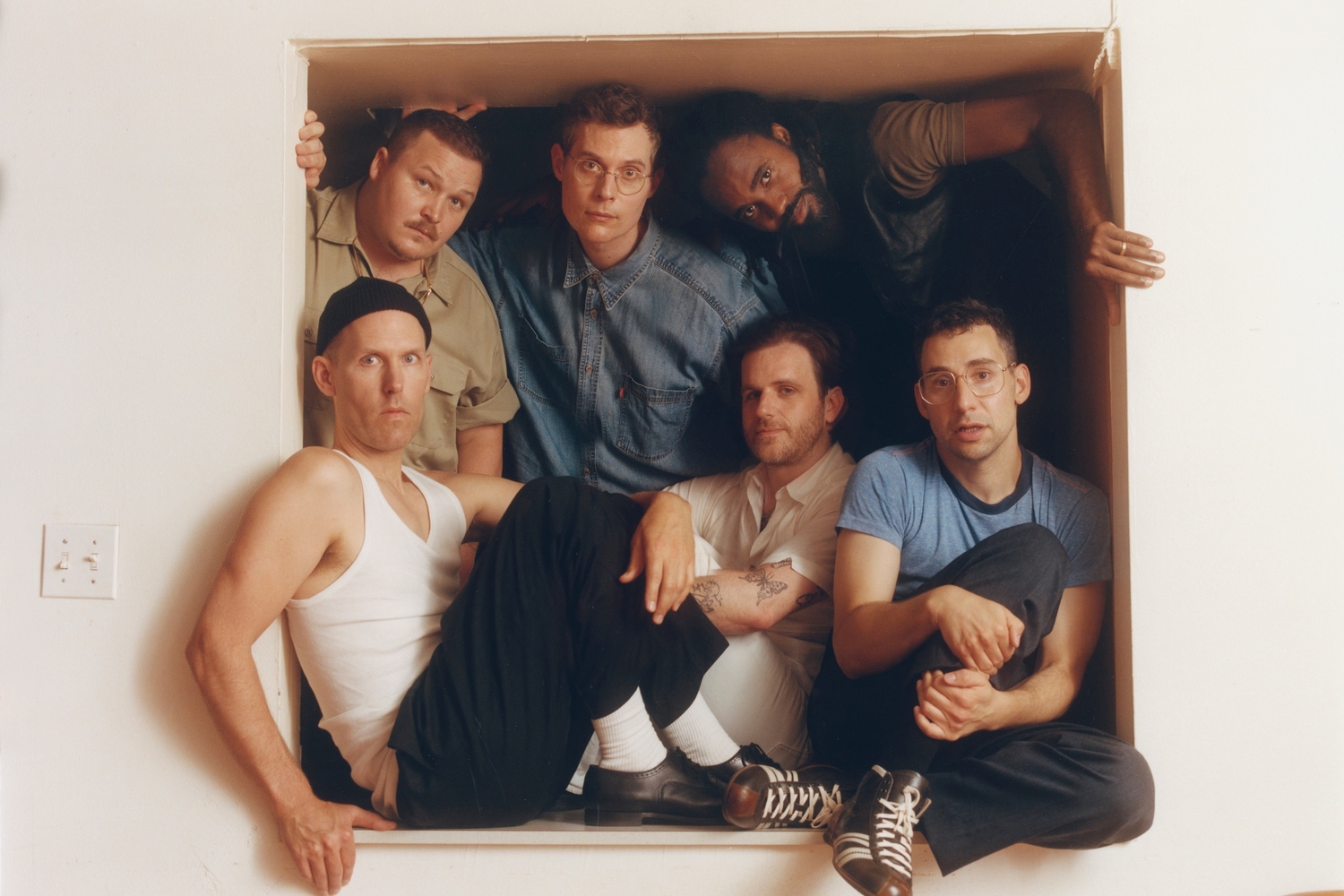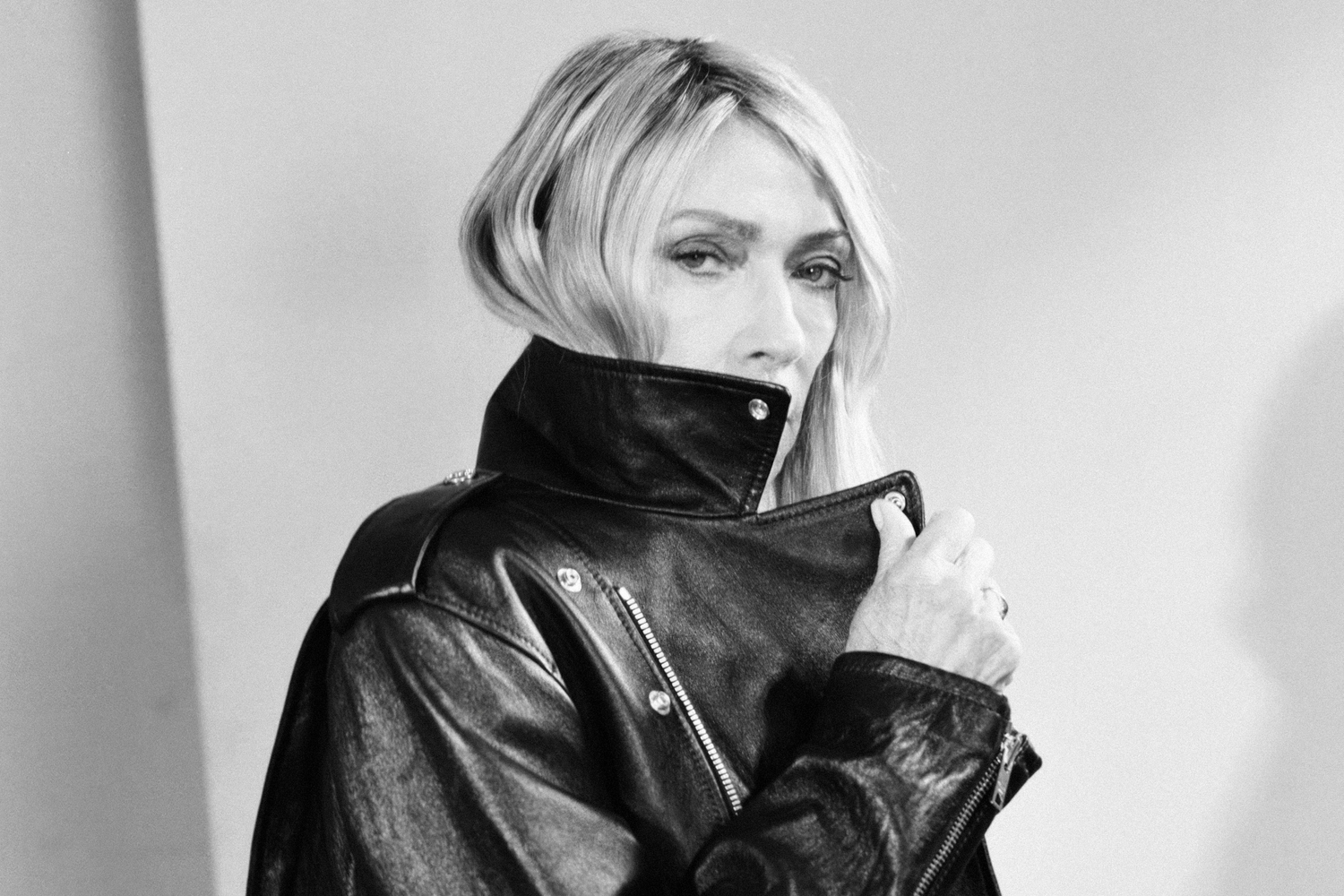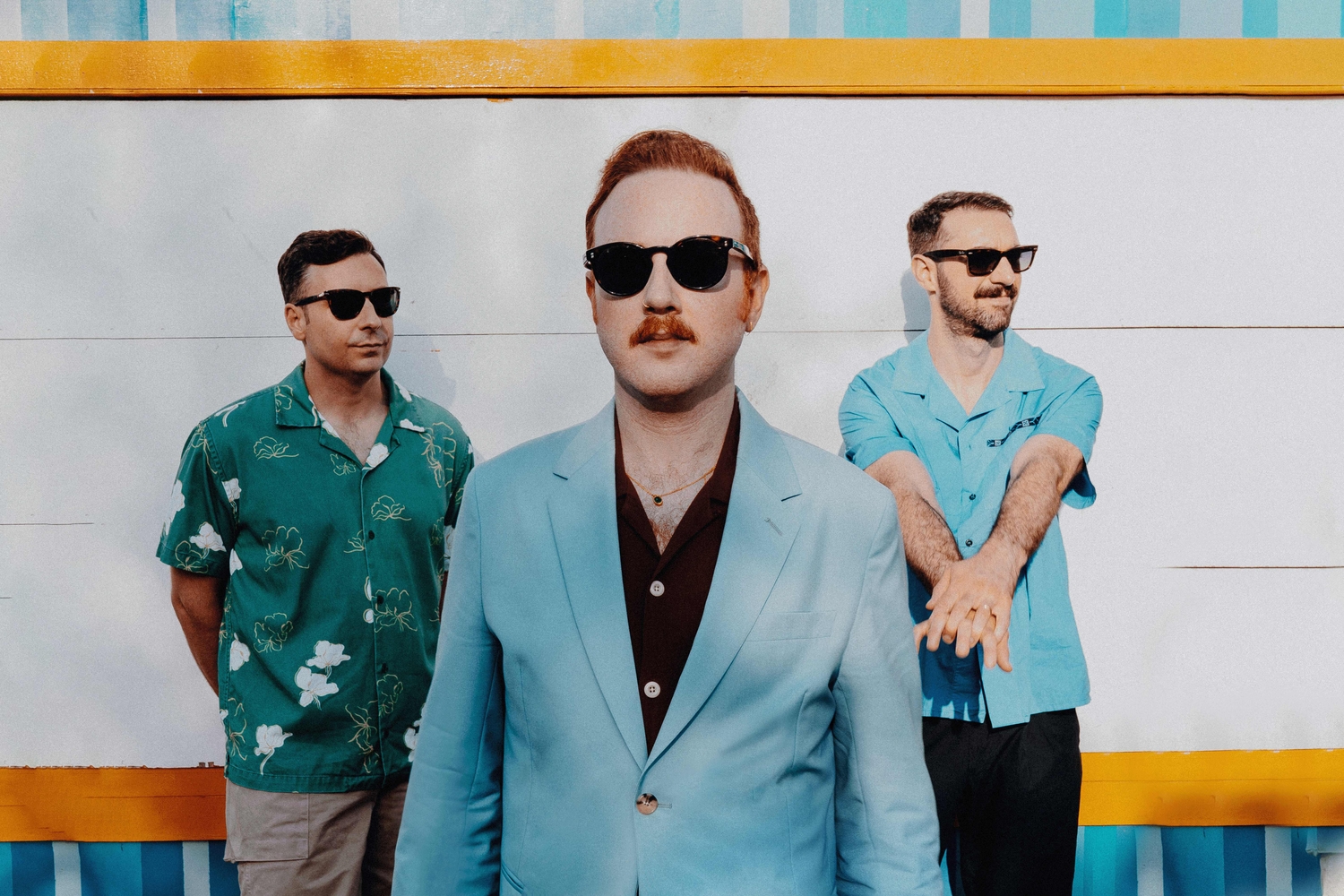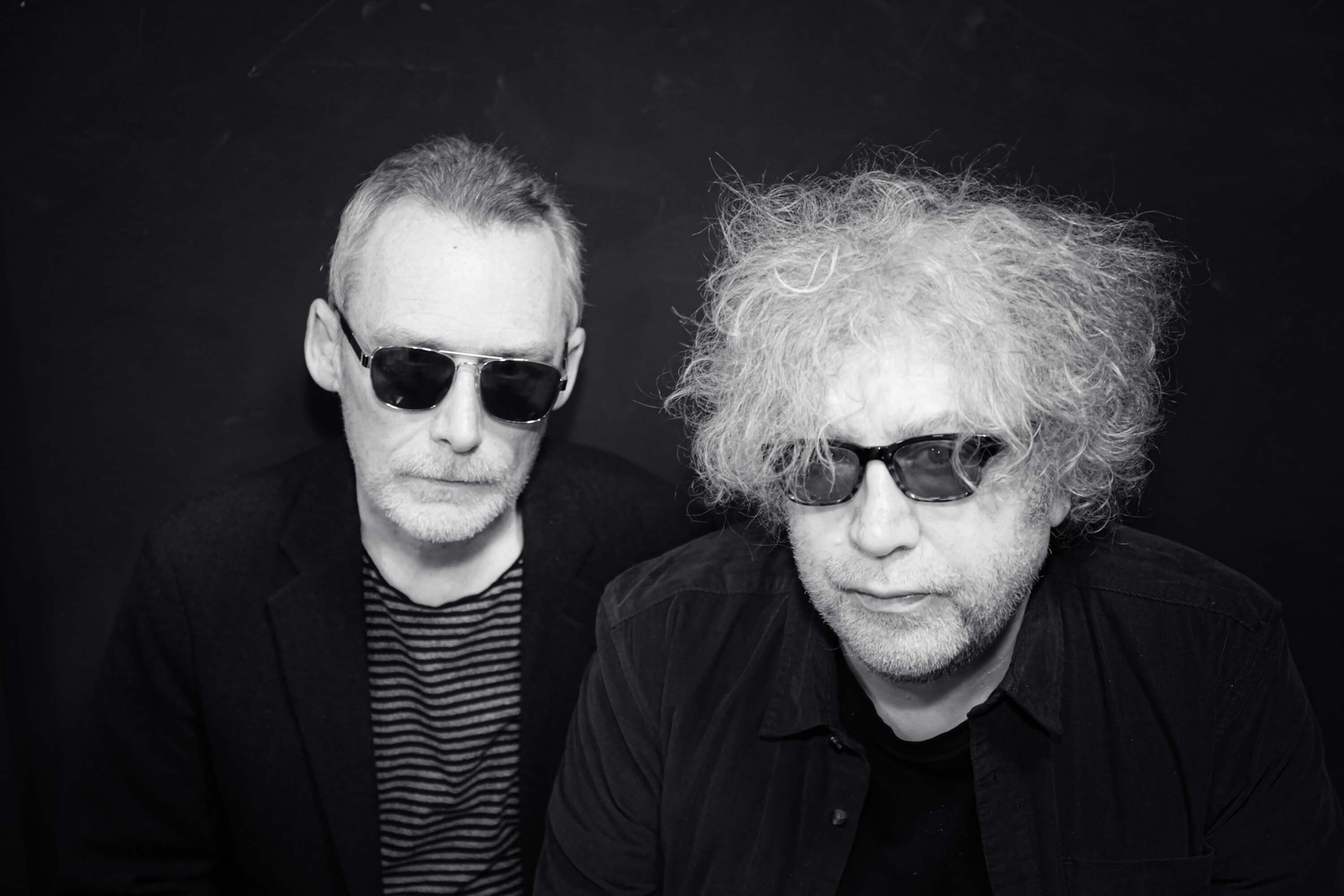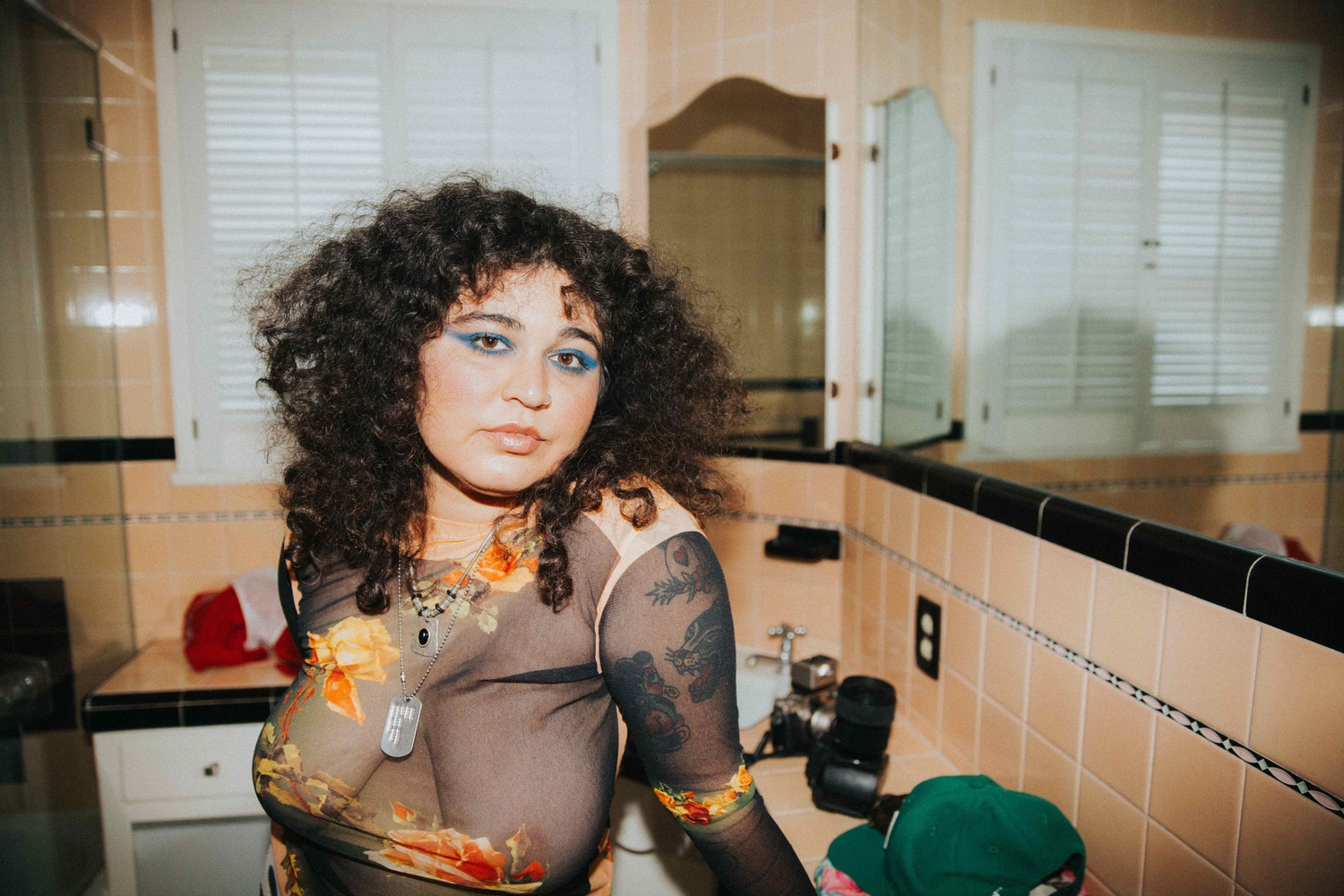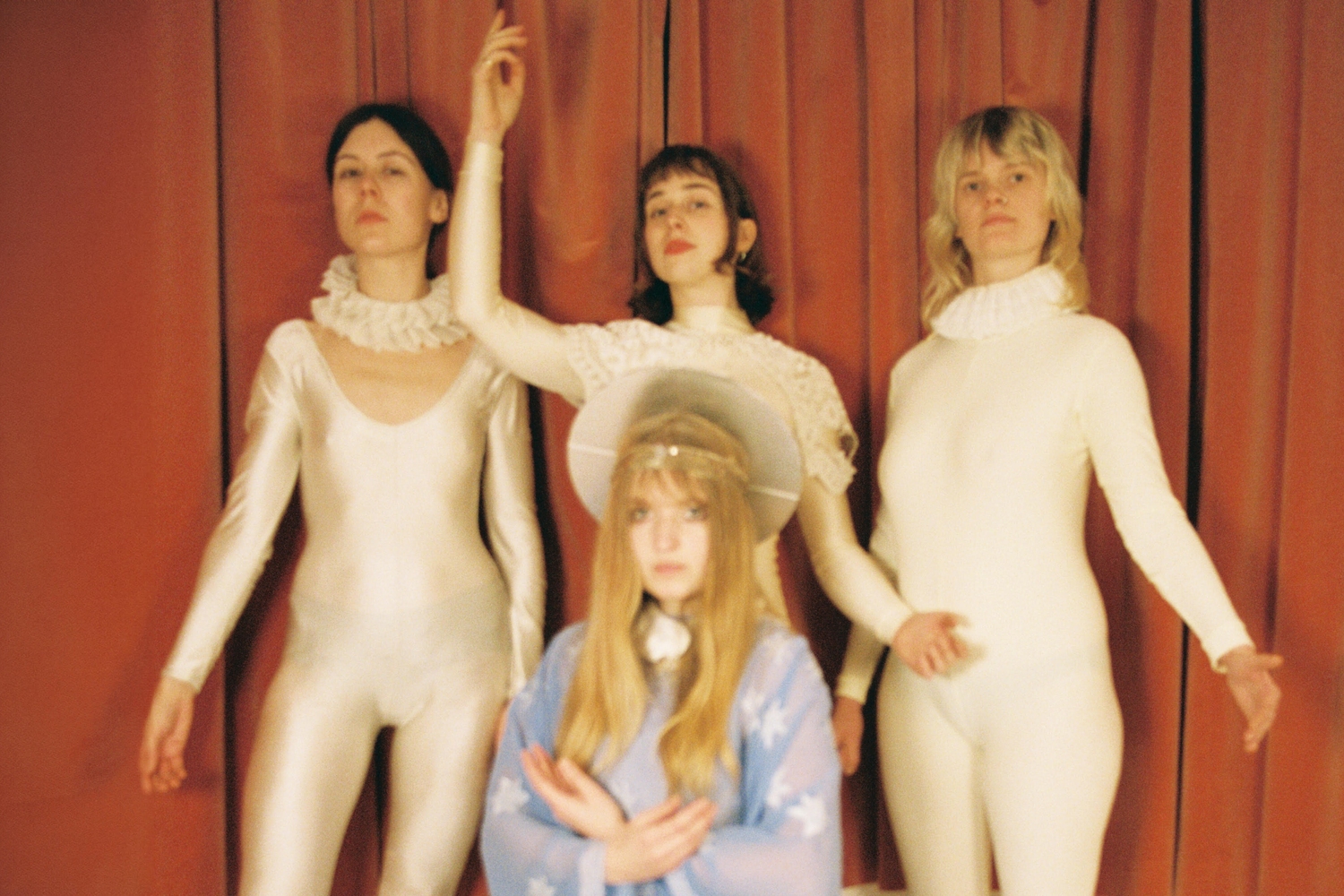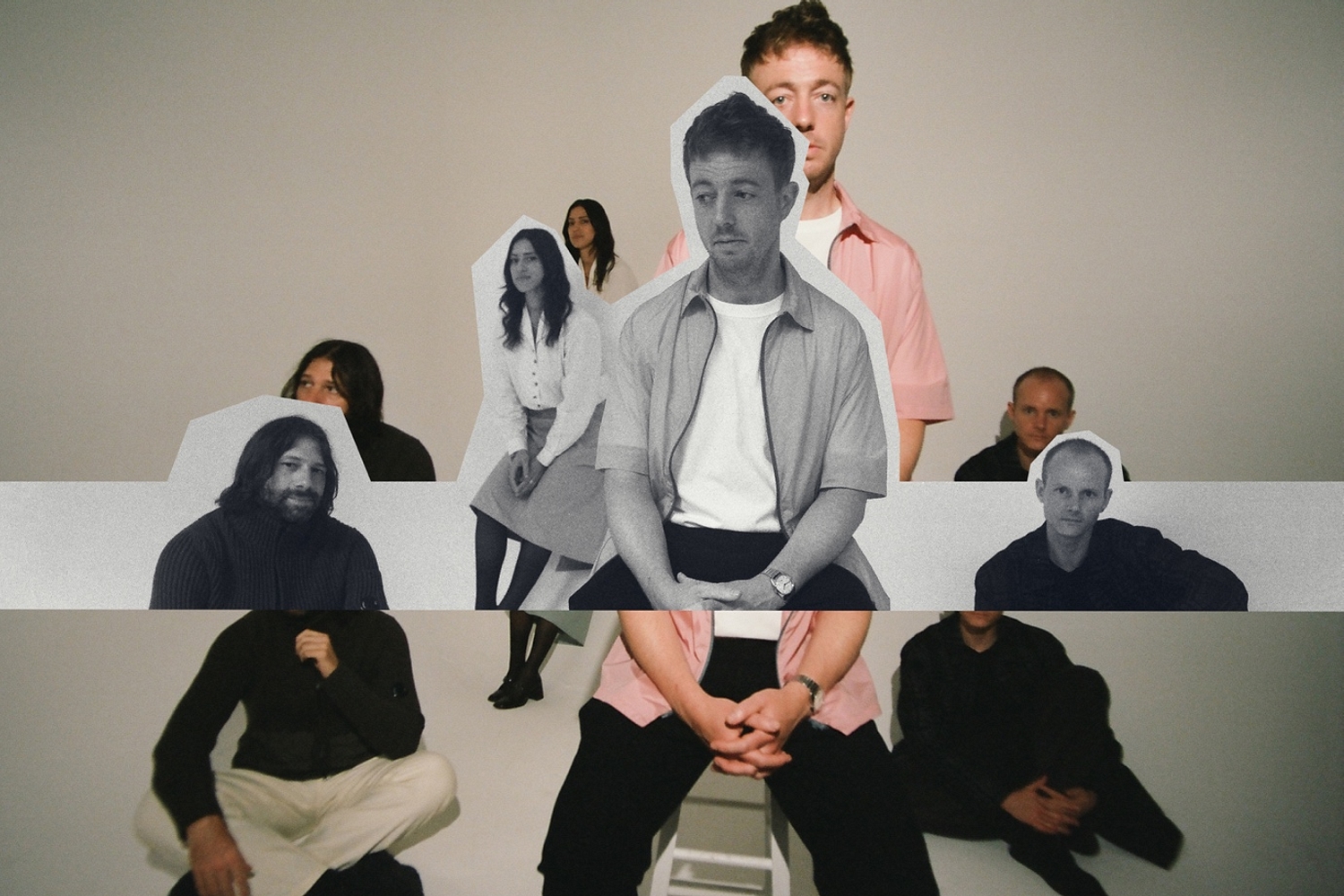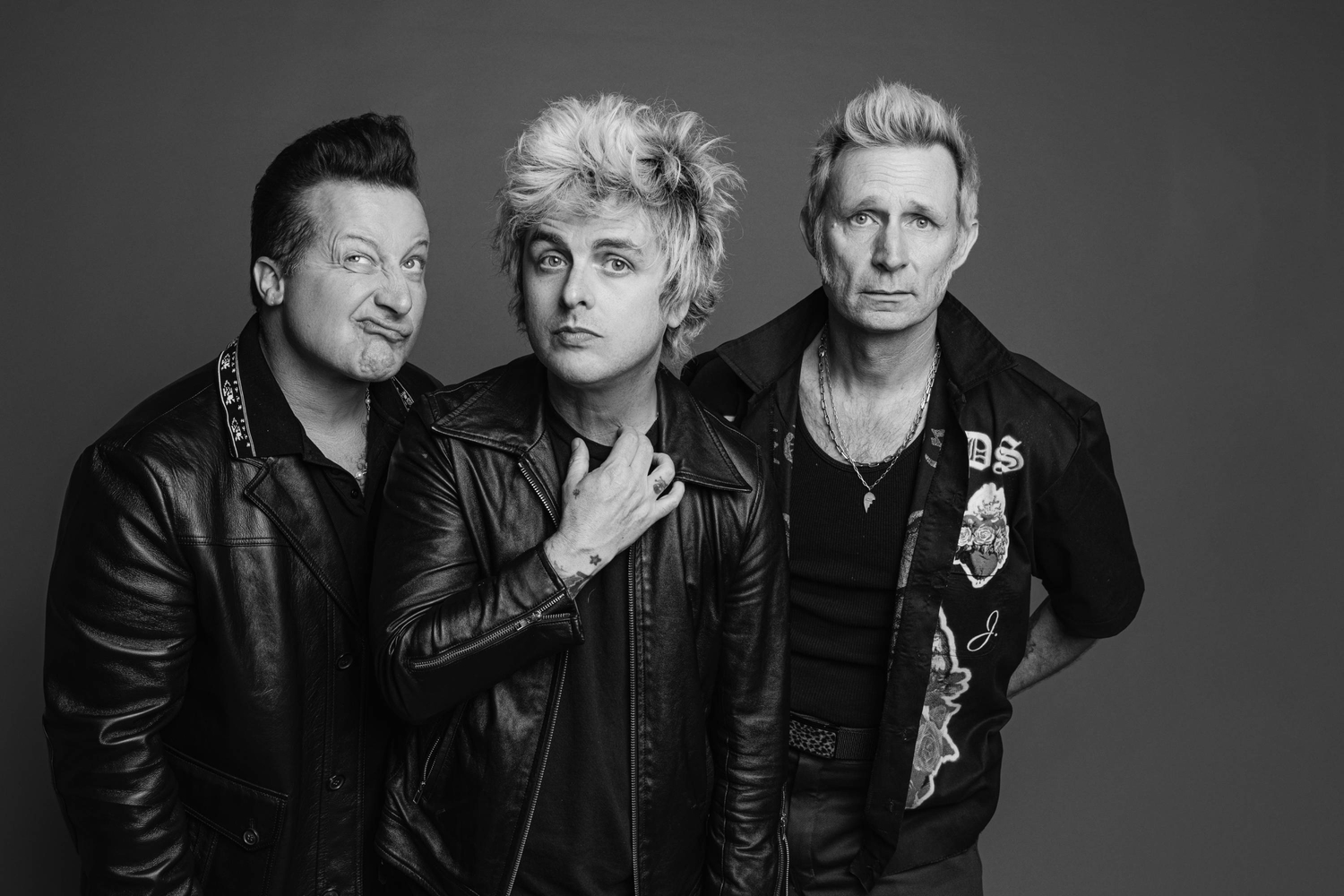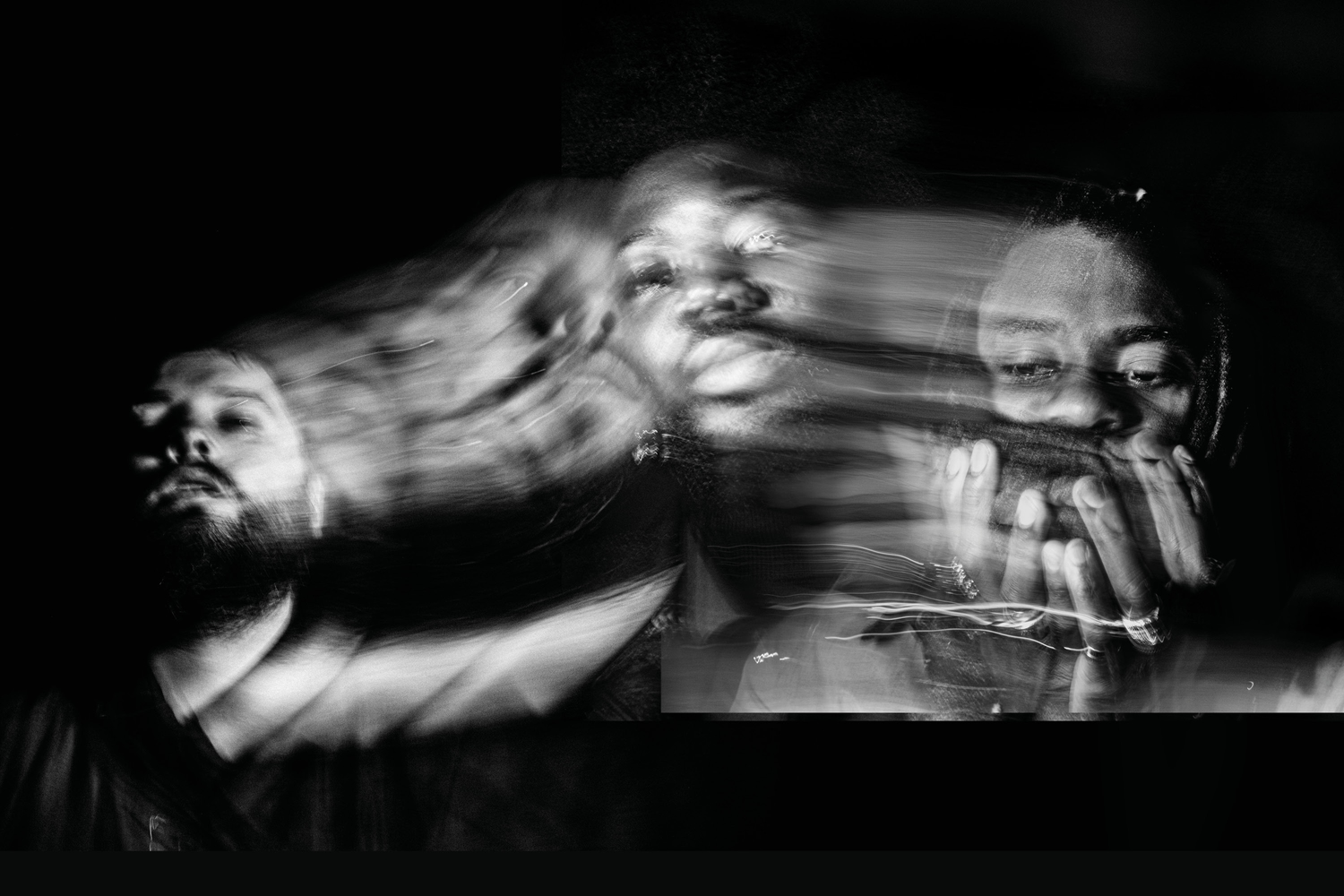
Cover Feature Heavy Is The Heart: Young Fathers
Young Fathers stand as one of the most creative, boundaryless bands of their generation. Now, with fourth LP ‘Heavy Heavy’, they’re channelling it into a record that puts human connection at the fore.
Young Fathers’ studio space is a complete mess. The floor of the small basement room is strewn with loose cables, stray pieces of soundproofing foam, discarded instruments and unidentifiable detritus. The windowless walls are scattered with crumpled pictures printed out and tacked to them – one displays an image of some distant galaxy, some are heavily stylised monochrome portraits, others show crowds engaged in different acts of collective ritual or communion. In the background, an unidentified piece of apparatus emits a quiet but constant static hiss, as if the room is poised to burst back into cacophony at any moment. On the whiteboard, meanwhile, are stickman sketches of a potential stage setup, and half rubbed out above it is the title of the new record that the Edinburgh trio made among this jumble of influences: ‘Heavy, Heavy’.
The hub has the atmosphere of a living room belonging to a group of precocious art students, creative energy humming in the spaces where order has been removed. This, says the band’s Graham Hastings, is the point. “These kinds of surroundings are more comfortable,” he says. “It feels organic, authentic to us,” adds his bandmate Alloysious Massaquoi. Kayus Bankole puts it more plainly. “You can hit stuff as hard as you want to,” he exclaims with a grin.
After the long and tortuous studio process for Young Fathers’ last record - 2018’s ‘Cocoa Sugar’ - this time, the band wanted to foster spontaneity. “Graham set up the studio so we can all put our hands on stuff, hit things, play things, and see things happen instantaneously,” says Kayus. To demonstrate, before his bandmate has even finished speaking, Alloysious spots a knackered lap steel guitar among the detritus and begins playing. It’s out of tune and half of the strings are broken, the noise he makes is a discordant drone, but even now his playing is thrillingly intense.
As much as possible during the sessions, they avoided retakes and didn’t worry about overspill or feedback in the background. The smallness of the studio meant that when the mics were rolling, even a distracted murmur in the corner or a rhythmic stomp of feet could be picked up and used. “When you get that kind of freedom in a creative space, that’s something you just can’t beat,” Alloysious says. “It’s gold dust.” At points ‘Heavy Heavy’ fizzes with more energy than anything the band have done before. Second single ‘I Saw’ is anchored to a pulsing, galvanising beat, all three trading vocals that spill out over one another in their eagerness to be heard. Tracks that slip back into slower tempos, meanwhile, are majestic, brimming at the seams with an emotion that sometimes erupts into overwhelming, joyous crescendos.
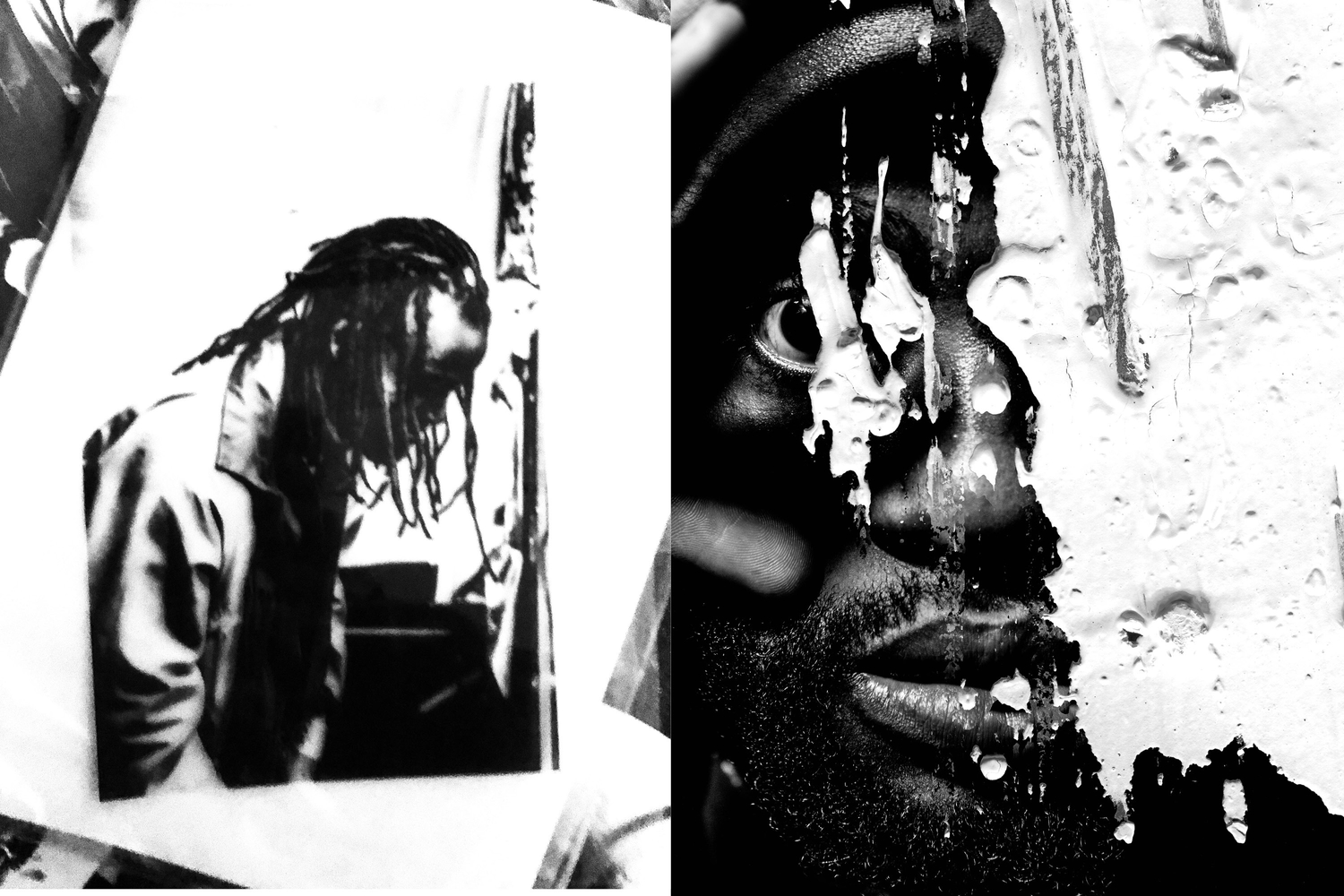
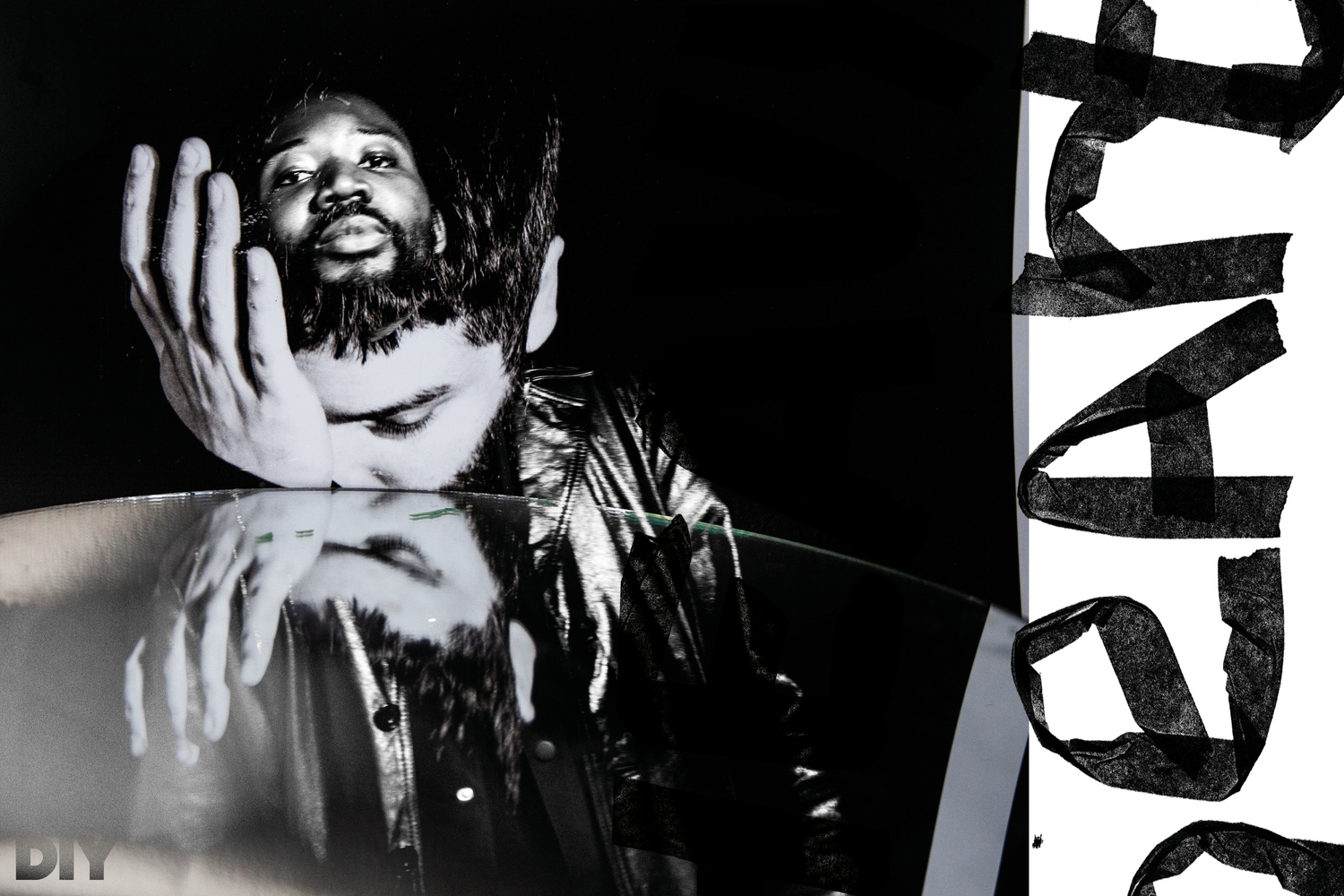
Having worked with one another for two decades, after meeting as teenagers at a hip hop club, Young Fathers are aware of how special the product can be when their energies are given so much room to combine. The diversity in those energies is what makes it so fruitful; in conversation Graham is cerebral and analytical, Alloysious speaks in passionate sprawls, while Kayus spends much of his time restlessly thinking before entering the conversation in a sudden charge. “We’re disparate and splintered, we don’t agree on a lot, but the music is where it meets and where it works,” Graham says.
The three musicians took a significant amount of time away from one another following the arduous touring schedule for ‘Cocoa Sugar’, so by the time they returned, that clash of energies was even brighter and more intense than ever. “We came back together with so many more ideas, more engagement, cherishing the moments we took for granted before,” says Kayus. He spent the downtime travelling in Africa and gathering inspiration, while Graham had his first child, giving him “a whole new lease of life.”
Given the amount they poured into it, however, it is notable that ‘Heavy Heavy’ is so short. It contains ten tracks, none of which are much longer than three minutes. It is called ‘Heavy Heavy’ because it is dense, not because it is big, Alloysious points out. “It’s about the essence of what you’re trying to do or say. You base it on spontaneity, but then you have to package it, put it in a box that will then allow that spontaneity to cut right through.” Conciseness makes for a more intense impact, he argues. Having captured a feeling, they push as far as they can within those constraints “until it's totally maxed out.” Then, crucially, they know exactly when to stop. “Say what you need to say, then leave,” he continues. “Do you need anything more? Nope? So end the song there. That makes people want to hear it again.”
In many ways, Graham notes, Young Fathers are still the teenage boyband they formed at that club, writing their own pop tracks and dance routines while everyone else was rap battling. “We love a pop song,” he says. “All of us are of a different upbringing and cultural education, but that’s how we came together. It’s still rooted in a chorus, a rap, then a chorus again. For us, hooks have always been essential.” “In pop music, you need to cut through the fluff,” Kayus adds. And on ‘Heavy Heavy’, they leaned into these roots consciously, avoiding outside collaborators and keeping things strictly between the three of them. “It’s the first time we’ve been in that formation since we were 14, in a bedroom on a karaoke machine,” Graham smiles.
Of course, it is more than just pop music that informs Young Fathers’ work, which on ‘Heavy Heavy’ encompasses communal chanting, energising electronic rhythms, staccato hip hop bars, moments of serene psychedelic bliss, experimental vocal sampling, soulful introspection and more. In fact, genre descriptors in general tend to fall short. The three men sometimes play bingo with the various ways journalists have described them, Graham tells us: “The latest was ‘experimental rock trio’; I didn’t mind that one.”
For Alloysious, tying them down to genre feels pointless. “When I listen to music, the stuff I’m into is the stuff where I feel like I can swim in it. It’s not so rigid.” He punches his palm for emphasis. “Not so blocky. I enjoy old school biblical films - Ben Hur and Jason And The Argonauts - where there’s so much texture and imagination that I can move around in it. If we’re doing a song and I can feel it just hitting me in the head, I can’t get into it. I want to create textures that allow the listener to imagine themselves cocooned within it.”
Graham admits, however, that he gets frustrated when Young Fathers’ process is described as a mash-up of different styles. “We don’t go in and go, ‘What’s everyone listening to? Drill? Rap? Let’s take all those components’,” he says sharply. Instead, he argues that their work is probably best viewed as the exact opposite: a stripping back of generic and geographical boundaries in search of the inherent, universal power at the core of it all.
“With this album there was a lot of analysis on an ancient kind of level. When you look at streams of music from around the world – Aboriginal Australians using didgeridoos, or drones in Celtic music, or this documentary I saw about this little community in Louisiana on the edge of mainline society – there’s this string that goes across all of them that’s since turned into pop music, and even stuff like Kraftwerk,” he enthuses. “It’s stripping things right down to the bare bones. There’s something that all humans need to soothe themselves.” Adds Alloysious: “You can trace it back to Africa. Back to the source.”
The conundrum, Alloysious continues, “is how do you define that? You can’t, but you know it when you see it.” You could call it music’s ‘soul’, Graham argues, if only the word wasn’t taken. “People would probably expect us to come up and do some Temptations songs,” he notes, wryly. For Kayus, “it’s a feeling, an emotion, forcing humanity into what you’re doing; forcing soul into yourself in order to release.” Graham says that often, to bolster the presence of that ‘soul’ in their music, they will imagine a person to focus their attention on. “To have a human face or to use a human in a video cuts straight through to that main vein: What do humans like? We like to hear other humans, we like to see other humans.”
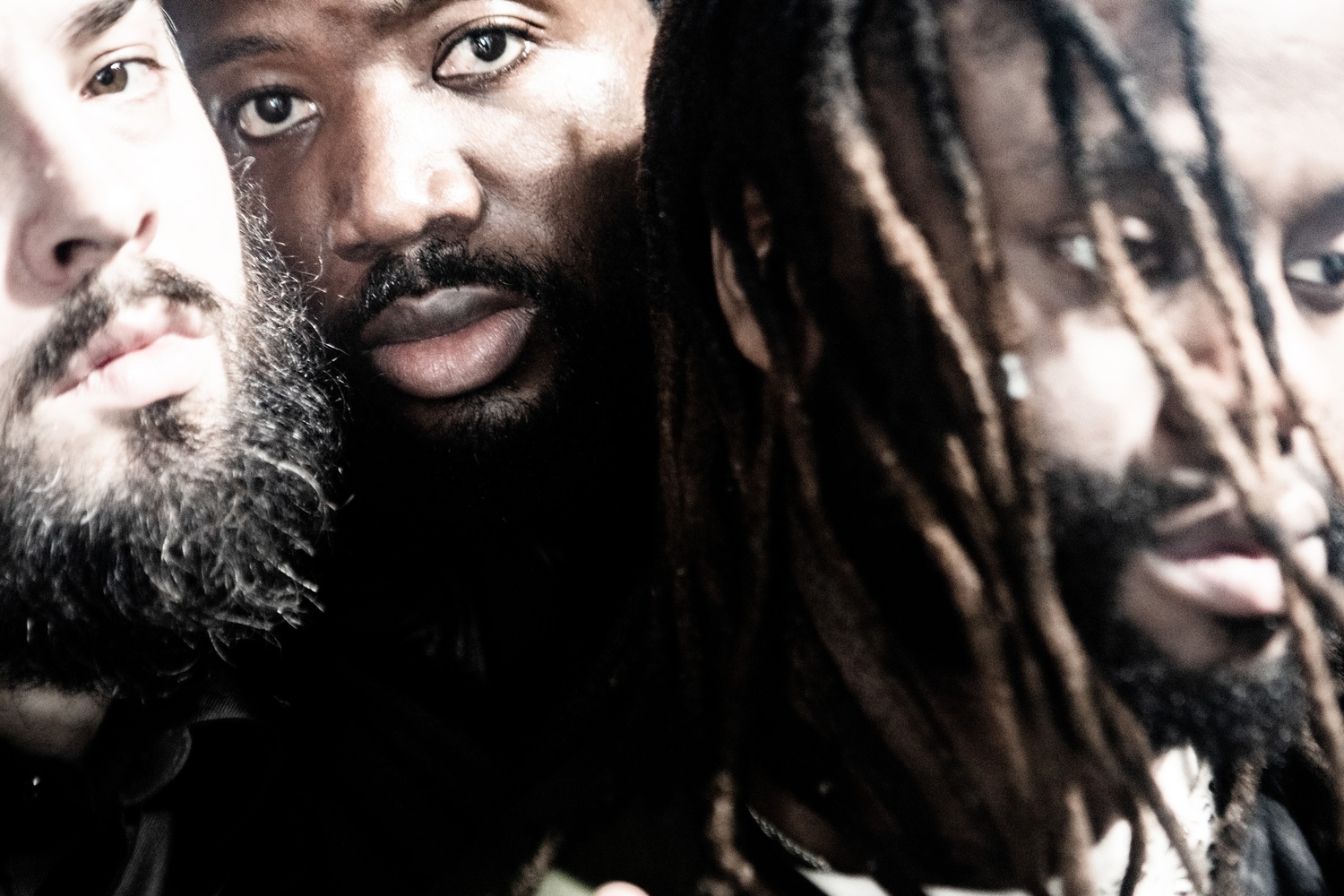
Above all else, ‘Heavy Heavy’ is an outward-facing record. It is full of calls and responses, chanting that invites you to join in, simple rhythms that compel you to move along with them. Part of Young Fathers’ focus on spontaneity in the studio was an effort to mirror the kind of energy that they reach at their live shows – “unbridled, raw, visceral,” as Alloysious puts it – and most of all it brings the communal aspect of their performances to the fore. Seeing Young Fathers live can be collective in its joy; ‘Heavy Heavy’ seeks the same level of power.
A cynic might fear that the warmth of the record means a blunting of Young Fathers’ confrontational edge - the kind of spirit with which they gave their second album the provocative title ‘White Men Are Black Men Too’, or agreed to soundtrack a Nestlé advertisement only to compose a song that protested the company’s aggressive marketing of baby milk powder in the developing world (the commission fell through; had it gone ahead, they were planning on spending the fee on an anti-Nestlé billboard campaign). At a time where the fabric of Britain is unravelling – we speak in the middle of the weeklong gap between Liz Truss’ resignation as Prime Minister after 45 calamitous days in office, and Rishi Sunak’s ascent as her unelected successor – is it not a little unusual that Young Fathers should be making the most uplifting music of their career?
It's not as if the band have switched off. “I mean, where do we fucking start?” Graham exclaims when politics is raised. “It feels like we’re at a fucking dire point for humanity.” It was inevitable that the way in which society has declined so dramatically since they last released a record would inform ‘Heavy Heavy’, he says, it’s just that their response to it is one of defiant joy rather than anger. As Kayus puts it: “To go against everything – to me that’s extremely political. We’ve delivered something overdosed with humanity. It doesn’t get more political than that.”
They did not write the refrain on galvanising recent single ‘I Saw’ – “Brush your teeth, wash your face, keep on walking the line” – to be an explicit political statement (“To us, the words just sounded interesting together”), but afterwards Alloysious realised it was a chant of resistance, a tribute to the power of keeping going. “We did a song about Brexit!” he exclaims. If the essence of music they try to extract can be called ‘soul’, “one of the most radical things you can do at this point is have a bit of soul,” Graham argues.
For all their provocative inclinations in the past, Young Fathers’ most powerful statements are those that they make quietly, their refusal to subscribe to traditional ideals of masculinity for instance. The night before our conversation, Alloysious recalls how a female friend commented on how often the band are physically close with one another in press photographs, and how strange she found it to see three men acting that way with one another. “Most men don’t do that thing unless there’s a problem, or if they’re drunk or watching a football game,” he points out. It’s been there from the start – performing original pop songs and dance routines while everyone else at the club “was trying to rap battle and calling each other the most dire names under the sun,” as Graham puts it, was in many ways a rebuke to alpha male energy.
Kayus, who spent part of his childhood in Nigeria, has always been struck by the cultural differences when it comes to male relationships. There, he says, “I was holding hands with my schoolmates to walk down to the shops. Here, that’s just not a thing, there’s an apprehension to being that open.” It comes back to the release they seek through communal experiences, “letting loose of everything that’s holding you back from expression, not worried about fashion or being cool, just liberated to the max,” he says.
“We’ve always said, thank fuck we make music,” adds Graham. “Thank fuck we can express ourselves.” The band regularly reminisce about one incident in which they got speaking to a man who had been a street fighter. “He was a big lad,” Alloysius recalls. “Graham and I grew up with people like him; he was repressed and bottled up, he didn’t know how to have that outlook.” By exposing him to their music in all its emotional expression, however, they managed to forge an intense human connection. “Maybe we caught him at a vulnerable moment or something, but he saw something in us and thought, ‘That’s in me too’,” Alloysious continues. “He’s had to build himself up in this masculine sort of way to find his self-worth, but speaking to us and having an open and candid conversation, he ended up breaking down in tears.”
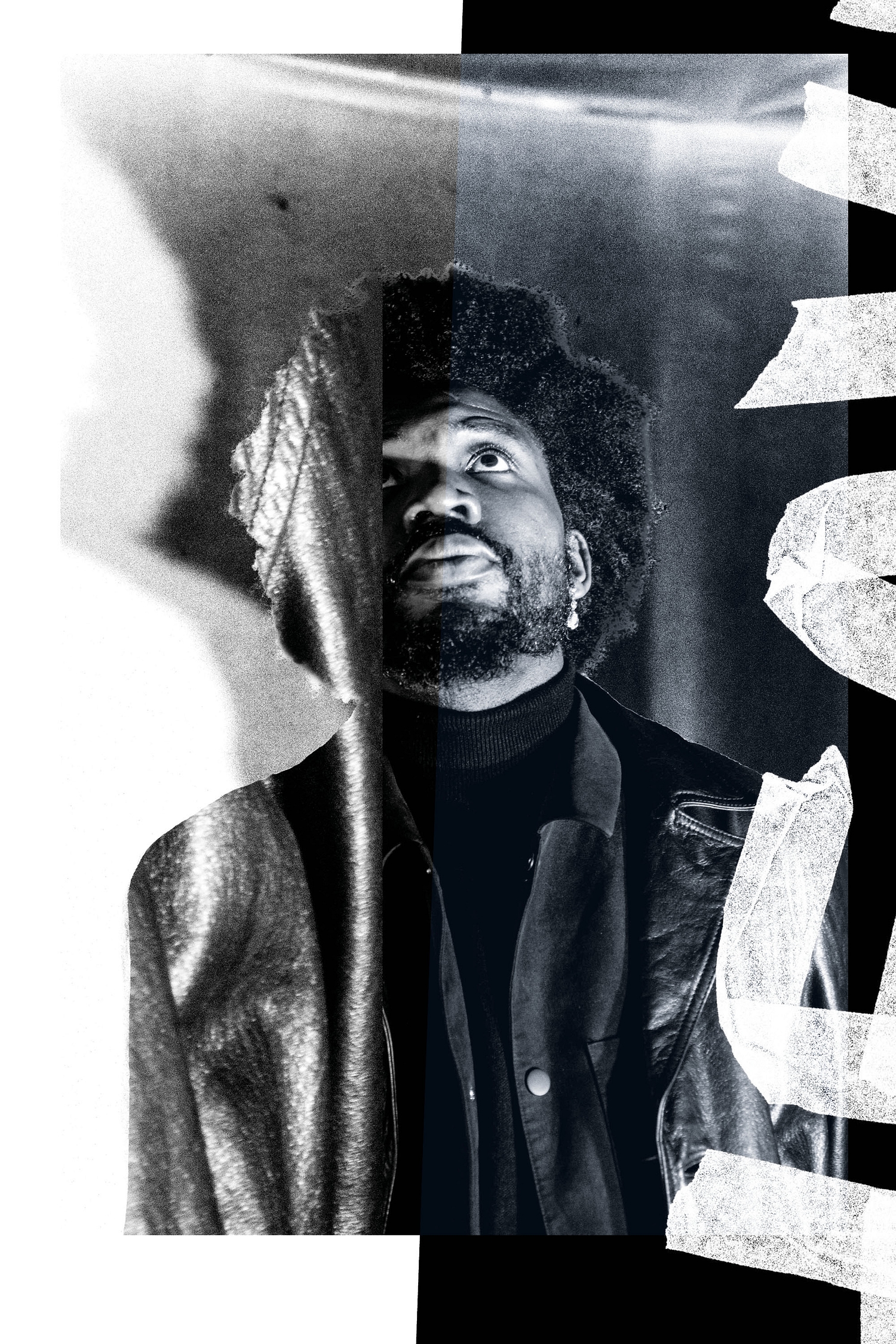
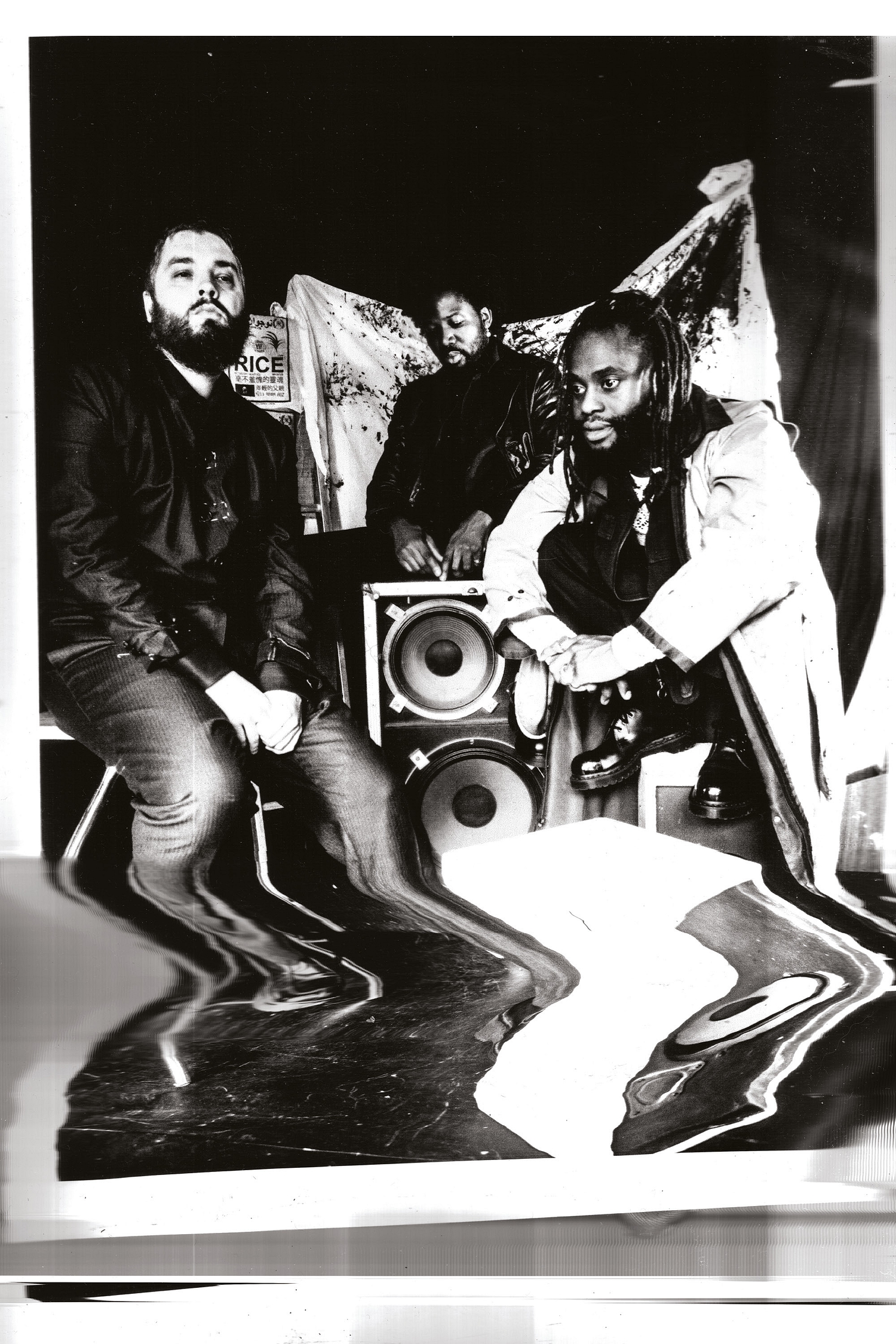
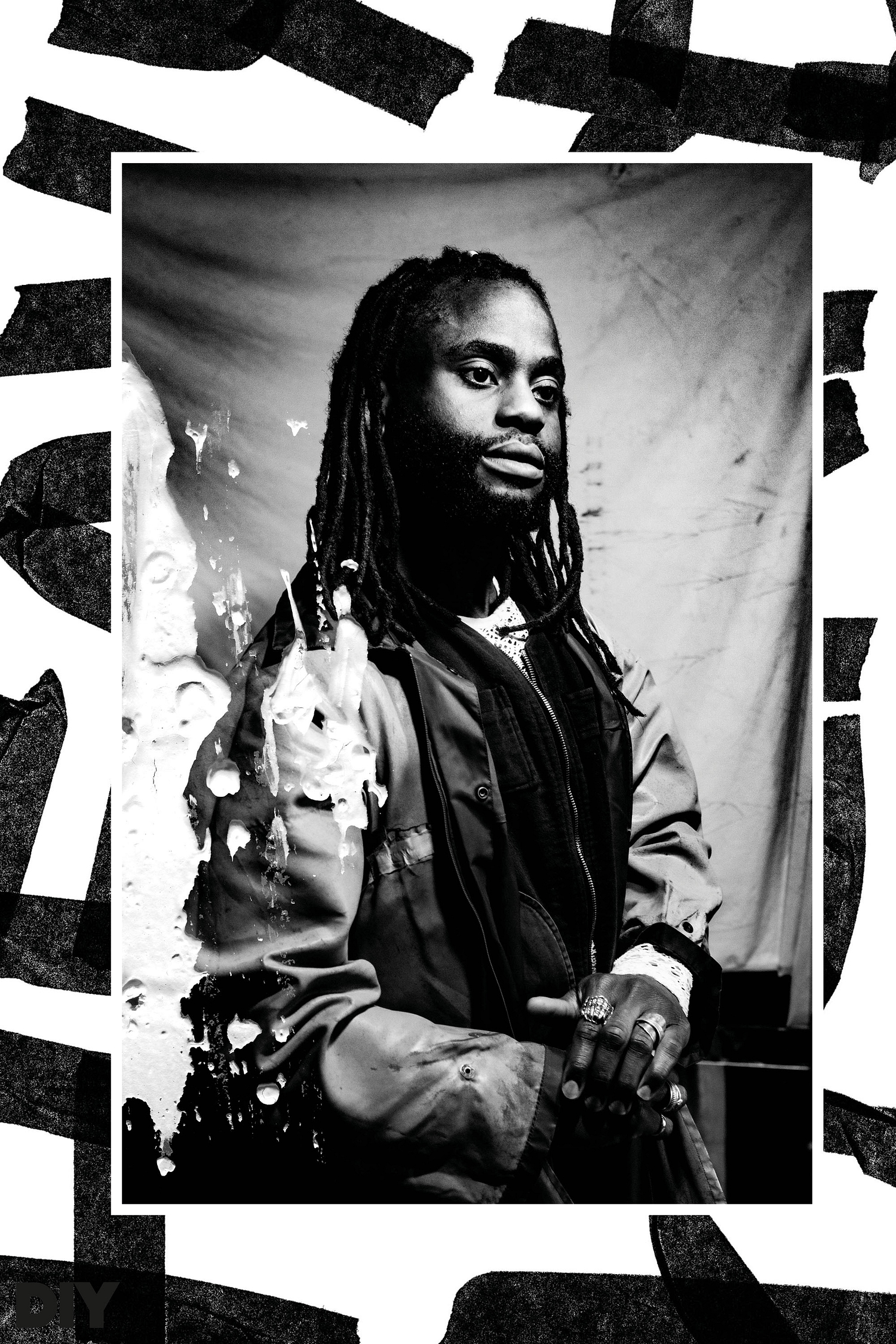
The simple fact of Young Fathers’ continued existence as a band is a statement in itself. “We’ve always had to work hard,” Graham says. “There’s the avant-garde, creative side to what we do, but then there’s also the side to us of being three working-class people. For us, making music is not a luxury, it’s not a lifestyle. If we’re not making money, we have to go and get another job.” When they won the Mercury Prize in 2014 for their debut album ‘Dead’, the most important impact it had on their career was not increased sales or bigger festival bookings, but the fact that the people closest began to realise the commercial viability of their art. “The best thing about that award was that it legitimised us to our family and friends,” says Alloysius.
“We’ve never felt part of a scene, we don’t want to be, but it does make us harder for the label to package and sell,” he continues. Kayus points out that there are often racist undertones to the way they’re perceived. “Sometimes we’re not Black enough. Not ‘urban’ enough,” he says. When they first travelled to America, their television bookings were mainly for rap shows; audiences loved it, but they “never got a call back.” He and Alloysious, the band’s other Black member, recall the multiple times they have been mis-captioned as each other in photographs.
It’s a source of frustration that their refusal to conform to genre has meant that mainstream pop platforms have been reluctant to feature them. “Why doesn’t 1Xtra play us?” asks Graham. “It’s not perfect enough to fit in there,” answers Alloysious. “But if they just played us, people would like it!” On the other hand, however, the band are proud of their outsider status. “The diversity of people that come to our shows is cool,” says Kayus. “It’s a big middle finger to fashion. Fuck fashion. Fuck being cool. Fuck everything that puts you behind a fucking fence.”
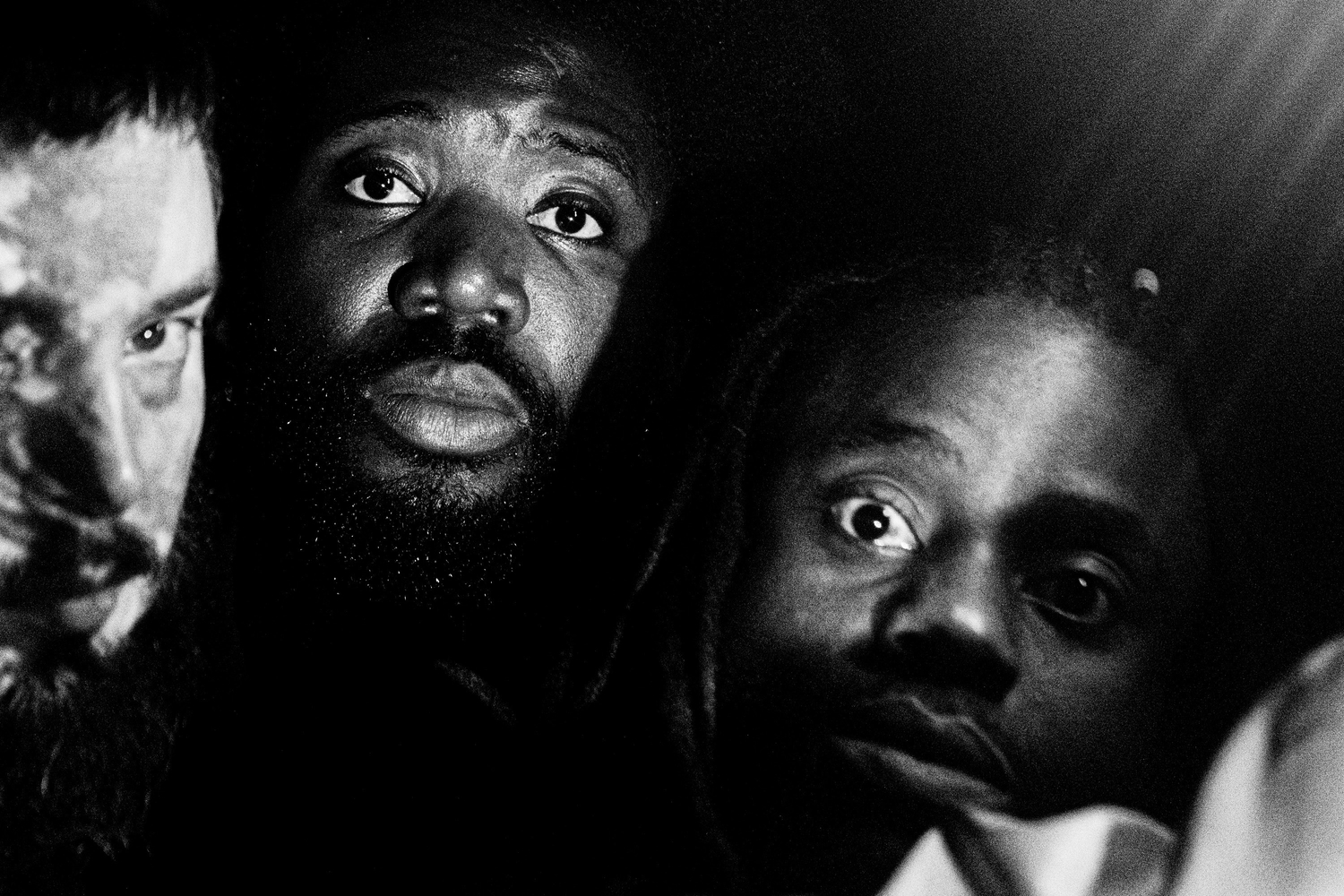
‘Heavy Heavy’ is out 3rd February via Ninja Tune.
As featured in the November 2022 issue of DIY, out now.
Read More
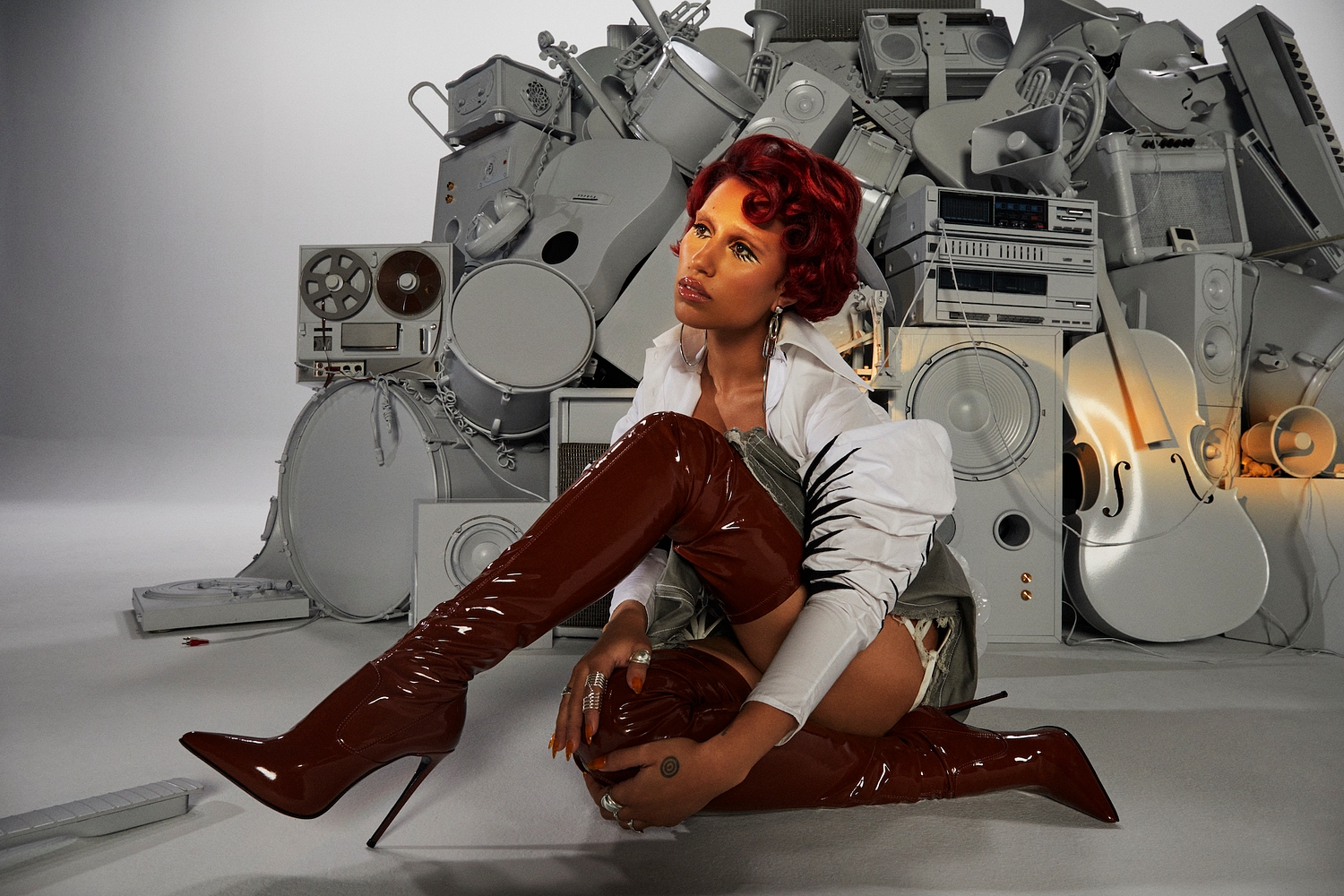
Public vote now open for BRIT Awards 2024
Fans are eligible to vote for who they think should win the ceremony's five genre awards.
1st February 2024, 12:30pm
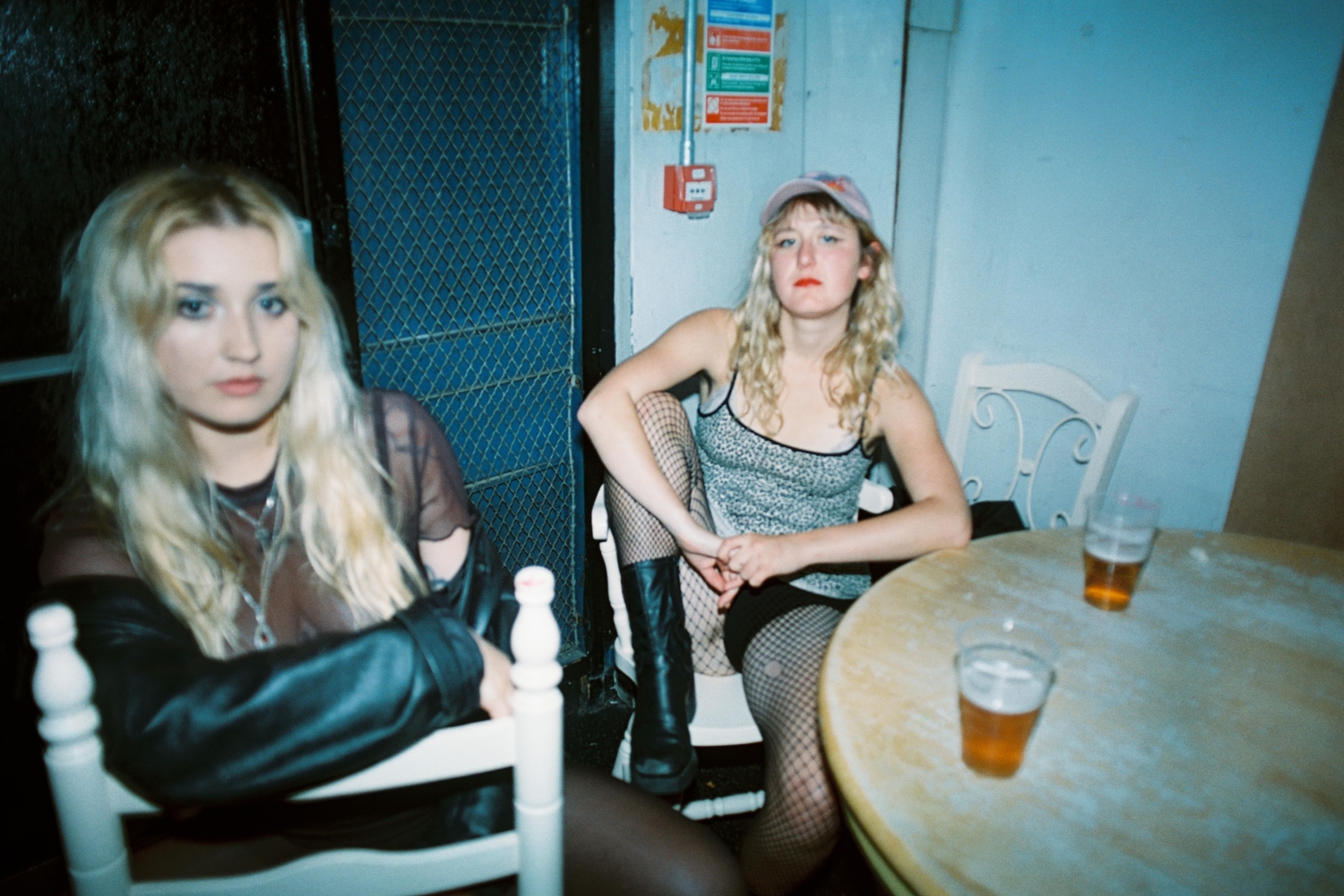
Wide Awake announce Lambrini Girls, Dry Cleaning, yeule and more
The Brixton day fest will welcome King Gizzard and the Lizard Wizard as this year's headliners.
1st February 2024, 12:18pm
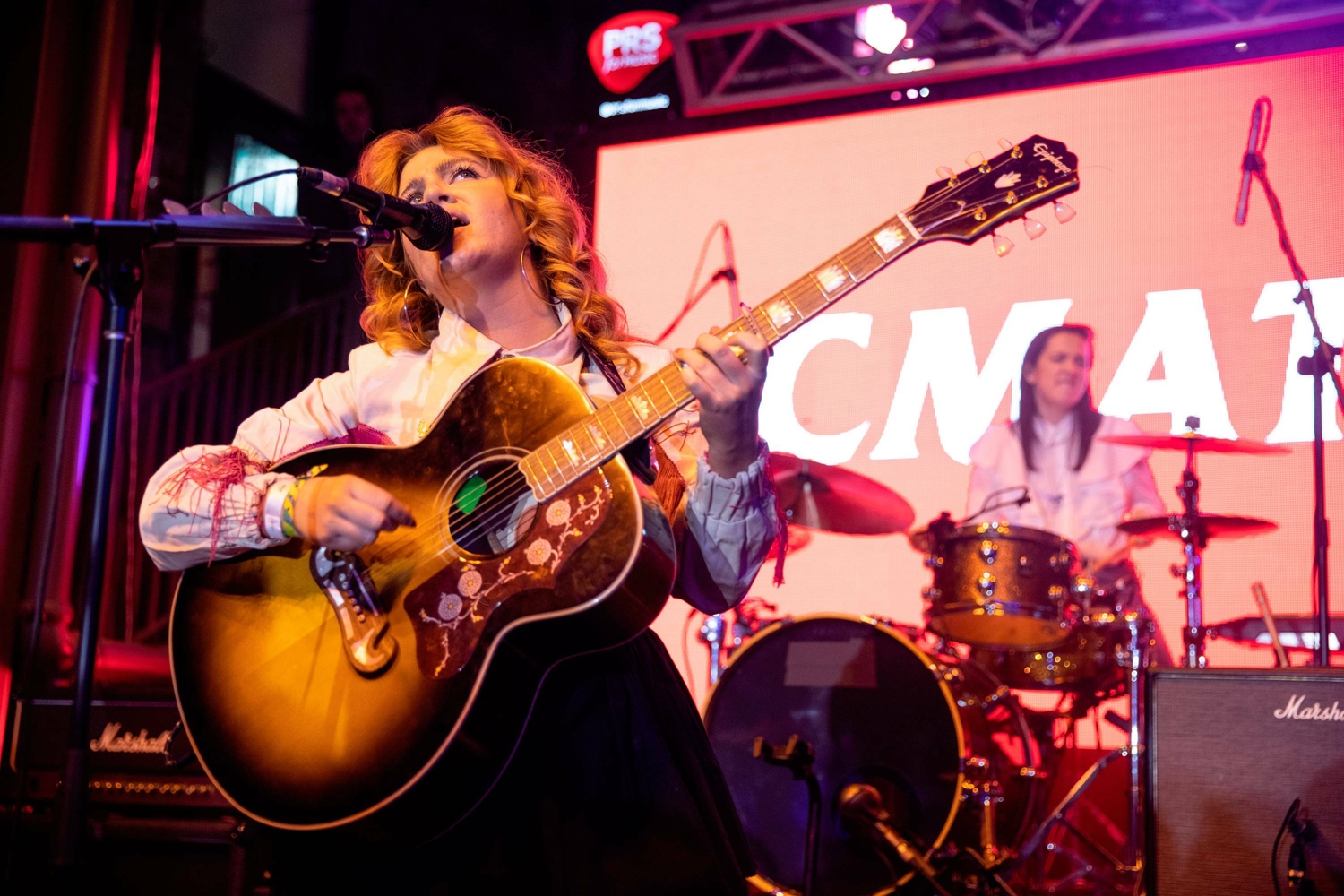
CMAT, Gossip, Young Fathers and more to play BBC Radio 6 Music Festival 2024
It'll take place over four days in Greater Manchester this Spring.
17th January 2024, 12:19pm
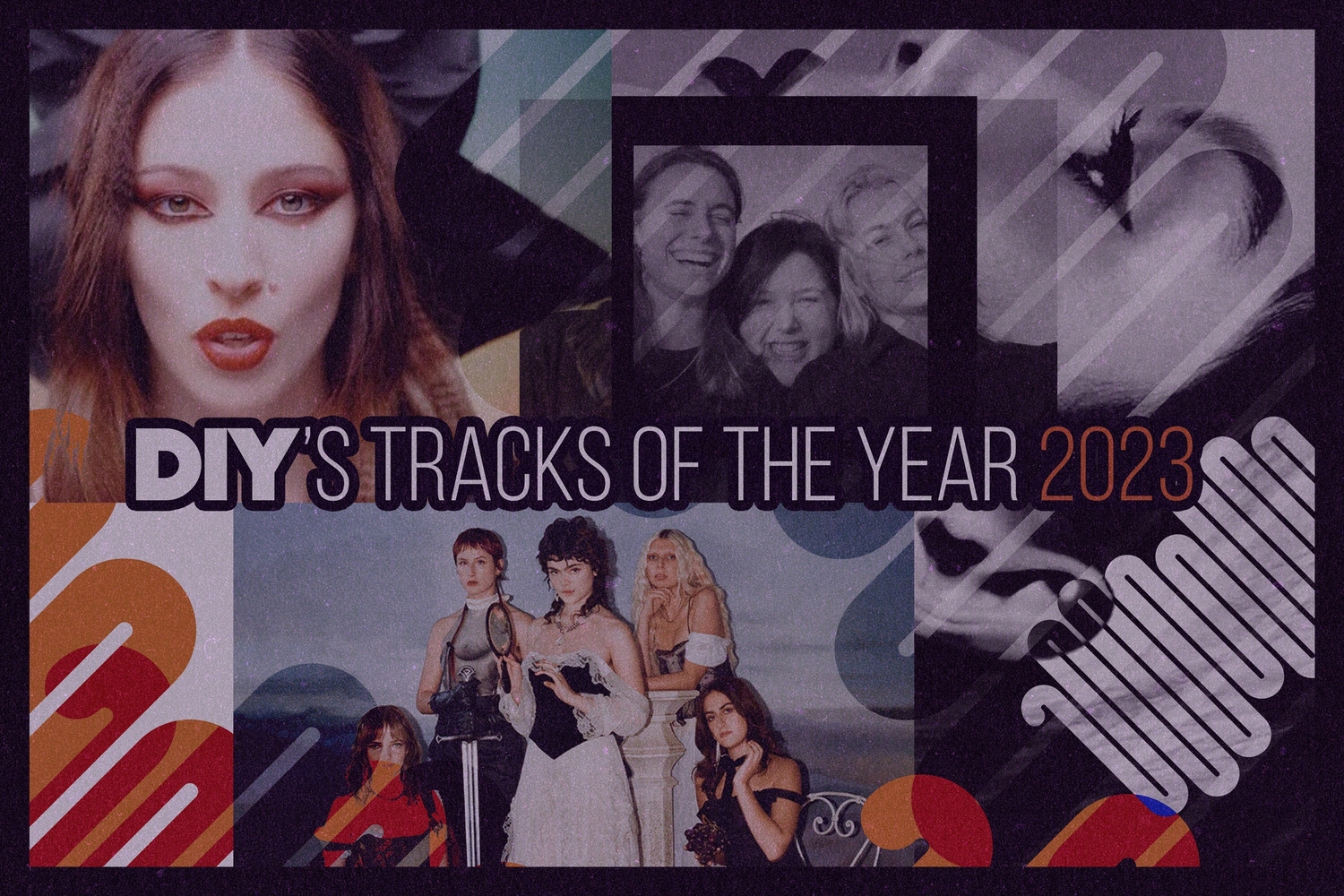
DIY’s Tracks of the Year 2023
From debut singles to established artists breaking bold new terrain, this is what's dominated our collective headphones since January.
8th December 2023, 5:00pm
